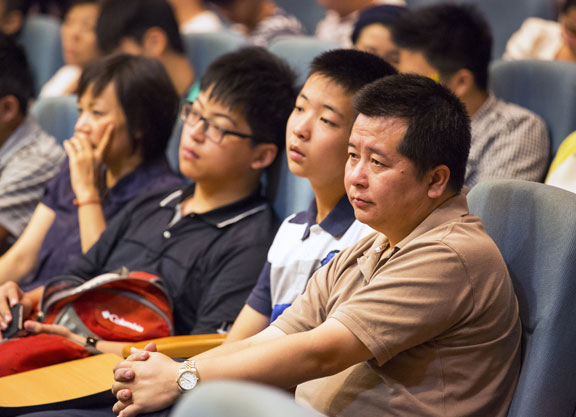When an international family sits down with an educational agent, there are several initial questions an agent will ask them: “Where do you want your child to study?” “What is your child’s academic achievement range? And perhaps most importantly, “What colleges or universities are of interest to you and your child, for a time after he or she attends an American high school?”
International families from China will almost always be motivated to apply to your school if historical data indicates that graduates consistently attend top-ranked colleges or universities. It’s actually why we’re so insistent on analyzing a new partner’s college data before we even begin our partnership.
Moreover, families from China are motivated to select a high school in the United States because the experience provides unparalleled preparation for life at an English-speaking college or university. Of the 300,000 international students studying in the United States on an F-1 Visa, more than 50,000 are enrolled in high school. But why are families from China so motivated to send their child to a college in the United States in the first place?
Here are three major reasons why international parents ultimately want a U.S. college education for their children. These commonly held beliefs explain why parents care so much about college acceptance and matriculation data when considering a U.S. high school for their child:
College is a Pathway to Success Later in Life
If you walk into any agency office in China, you will find posters displaying students who were accepted to top-ranked colleges throughout the United States. The United States has some of the best colleges in the world, and a college degree is a ticket to success and wealth, especially for students from East Asia.
Historically, Chinese culture has always placed great emphasis on education as a means to success. In ancient China, the ruling dynasty instituted a test called the Keju, an entrance exam for citizens to join the imperial service. A passing grade meant a better life, and throughout much of China’s history, represented the only feasible way to elevate one’s social status. Today, many Chinese parents send their children abroad to avoid the dreaded Gaokao. It is truly a culturally ingrained value that education is the pathway to success.
Over the past 50 years, the Chinese middle class has grown significantly. With that growth has come a willingness to spend more money in general, but specifically, to spend on education for their children. Because of the now abolished one-child policy, often there are two sets of grandparents, in addition to two parents, who provide support for a single high school-age student. Most importantly, that growing population of middle-class Chinese inherently knows the value of an American undergraduate degree, and is eager to ensure that their children are poised for success in their post-grad lives.
Parents Want Proof of Concept and Return on Investment
At an American high school, as Chinese students improve their English, they further their understanding of how to succeed in an American classroom, and are encouraged to think creatively and discover their own unique identities. Parents are aware of the many benefits their children gain from attending an American high school, but the most significant benefit they perceive is that international students educated at U.S. high schools are more apparent to admissions officers at colleges and universities around the country.
Parents are giving up valuable time that they would themselves have spent with their children, and investing many thousands of dollars to send their children to schools in the United States. With every large expense, both in personal lives and in business, a return on investment is expected. Parents want to see that high schools are committed to preparing students to apply to top colleges and universities, and that the students are positioned to gain admission to these top colleges.
International Applicants are Focused on Results, Especially with Regard to Education
International students are also results-oriented, because they have been indoctrinated into an education system that assesses their abilities purely on one, or very few test scores. Moreover, students are familiar with test scores as a huge (if not the sole) factor in determining their acceptance into a certain class of college. Even though international families are trying to escape an education system that evaluates individuals based on one single, days-long test, these applicants will still make decisions based on numbers; they cannot easily escape the results-oriented mindset.
It’s also important to remember that an international student will likely not have any in-person interactions with school officials prior to arrival. Rarely will a student get to experience campus life or culture before applying to a school, so decisions are initially based on numerical or statistical information. In other words, applicants do rely significantly on the SAT scores or college acceptance rates provided on school profiles. This is not to say they will not consider qualitative traits of a school upon further investigation. However, the initial “filter” students will apply to high schools throughout the United States will consist of location, price, and college acceptance and matriculation data.
If you’re new to marketing your school in China, we hope this has been a helpful introduction to the importance of promoting your college acceptance and matriculation results to potential applicants and recruitment partners. Rest assured, Cambridge Network is committed to helping international families in China understand every facet of the great schools in our network, and to helping our students achieve their higher education goals and career aspirations.
